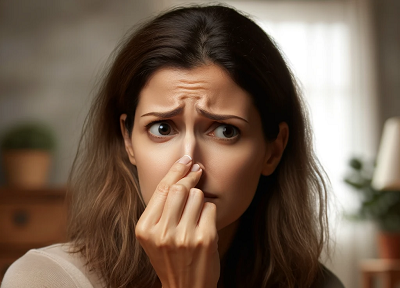Be Cautious: A Strange Smell After Menstruation Might Indicate Vaginitis
Menstruation is a normal physiological phenomenon in women. Sometimes, changes in living environment, high stress, psychological factors, excessive exercise, gynecological diseases, and other factors can lead to changes in menstruation. The presence of an odor after menstruation can be due to physiological reasons, often caused by the poor quality and lack of breathability of sanitary pads.

However, pathological factors cannot be ruled out, with common causes being conditions like endometritis and trichomonal vaginitis, among other gynecological diseases.
For women of reproductive age, having a menstrual period is a normal occurrence, indicating that their reproductive function is functioning correctly. However, some women may experience an unpleasant odor in their genital area after their period, which can make them feel uncomfortable and embarrassed.
What Causes an Odor After Menstruation?
1. Physiological Reasons
If poor-quality sanitary pads with inadequate breathability are used during menstruation, the menstrual blood can irritate the external genitalia. This irritation can lead to the secretion of substances from the external genital glands, causing dampness in the genital area and resulting in an unpleasant odor. It may be accompanied by symptoms such as itching in the external genital area but generally does not involve abdominal pain or an increase in vaginal discharge. In such cases, it is recommended to clean the intimate area with warm water, and the symptoms should improve quickly.
2. Pathological Reasons
Gynecological conditions such as endometritis, trichomonal vaginitis, and pelvic inflammatory disease can lead to inflammatory secretions in the reproductive system. This can result in an increase in vaginal discharge. If not treated promptly, there may be a foul odor in the external genital area.
Untreated vaginitis can lead to a foul-smelling vaginal discharge, increased discharge, and itching, among other symptoms. For example, trichomonal vaginitis is a common vaginal inflammation caused by infection with Trichomonas vaginalis, leading to increased vaginal discharge, external genital itching, and thin, foamy, yellow-green discharge.
What Causes an Odor After Menstruation Due to Vaginitis?
The main symptoms of vaginitis include increased vaginal discharge, changes in the characteristics, color, and odor of the discharge, along with itching and a burning sensation in the external genital and vaginal areas. During the menstrual period and the days before and after it, hormone levels in the body are at their lowest, making the female reproductive system more vulnerable to infections during this time.
How to Treat Vaginitis with Odor After Menstruation?
Generally, the types of vaginitis that can cause vaginal odor are often trichomonal vaginitis or bacterial vaginosis. Once the specific cause is determined, both of these conditions can be treated with herbal medicine like Fuyan Pill to regulate and reduce inflammation, regulate menstrual cycles, and alleviate symptoms. For patients with trichomonal vaginitis, it is recommended that both sexual partners receive treatment simultaneously to avoid recurrent infections.
How to Eliminate Odor in Daily Life?
1. Pay Attention to Clothing: Many women, especially younger ones, like to wear tight-fitting clothes to accentuate their figure, even during their menstrual periods. However, such clothing choices can lead to increased sweating and body odor. During your period, opt for cotton underwear and loose-fitting clothing to ensure proper ventilation.
2. Change Sanitary Pads Frequently: Change sanitary pads regularly, ideally every 4 hours at most, to reduce contact between the skin and moist sanitary pads. If your menstrual flow is heavy, consider increasing the frequency of pad changes.
3. Maintain Hygiene: Some women avoid bathing during their periods to prevent infections, but this is not the correct approach. During menstruation, it is essential to maintain personal hygiene. If you go without bathing for more than two days, it is inevitable that there will be an odor from menstrual blood.
4. Focus on Intimate Care: Healthy women should learn to take care of their intimate areas. It's not just about spending time and effort on facial skincare but also about addressing concerns in intimate areas.
In summary, if you experience abnormal symptoms such as foul-smelling discharge or changes in color, it's advisable to undergo routine vaginal discharge examinations and promptly seek treatment once the nature of the vaginitis is identified. Additionally, maintain personal hygiene, keep the external genital area clean and dry, and try to abstain from sexual intercourse to prevent cross-infection during treatment.
Recommended Readings:
What's Going on with Itching in the Female Intimate Area? It Could Be Vaginitis
Is Cervicitis in Women Caused by the Male Partner?
previous pageCan Long-Term Use of Disposable Underwear Really Cause Vaginitis?
next pageTestimonials
- Adenomyosis with Ureaplasma Urealyticum Cured by Fuyan Pill
- Tubal blockage with hydrosalpinx can be cured by TCM shortly
- Fuyan Pill Helps A woman with Adenomyosis Get Pregnant
- A Woman with Hydrosalpinx Is Cured with Fuyan pill
- Pelvic Inflammatory Disease Testimonials
- Irregular Vaginal Bleeding and Endometrial Thickening Cured by Fuyan Pill
- Pruritus Vulvae and Frequent Urination: Mycoplasma Infection Cured after 2 Courses



